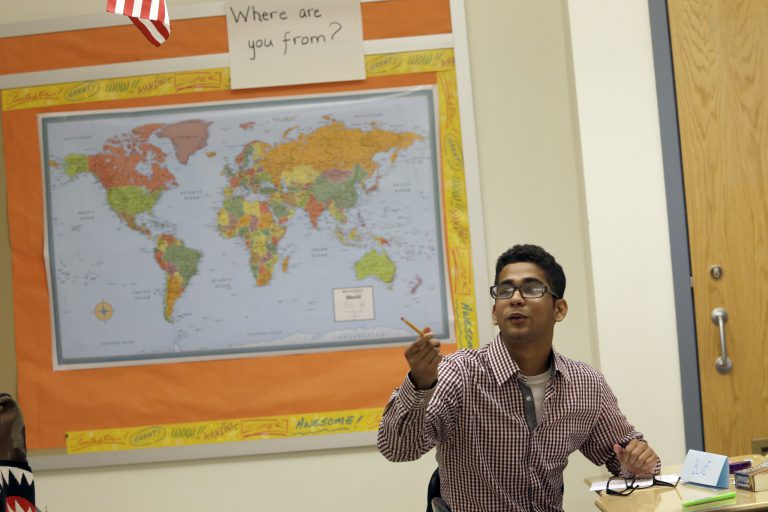This website uses cookies so that we can provide you with the best user experience possible. Cookie information is stored in your browser and performs functions such as recognising you when you return to our website and helping our team to understand which sections of the website you find most interesting and useful.

Education Ministers and public officials in Indonesia and Ukraine have announced plans to implement bilingualism across all national universities, as both regions attempt to push English as their second working language.
Muhammad Nasir, Indonesia’s Minister for Research, Technology and Higher Education, has promised to enforce a bilingual curriculum across the country’s higher education sector.
Scholars and education professionals from the region have drawn parallels between English and ancient Latin, since students and staff will be encouraged to communicate in English both in and outside of the classroom to promote fluency and understanding – this is similar to the medieval university system in which Latin was used as a ‘neutral’ language, allowing foreign students to communicate with each other.
Global: Is #English really the future at universities in #Indonesia and #Ukraine?https://t.co/ArTL8Qp7Z9 #highered
— UniversityWorldNews (@uniworldnews) February 15, 2016
History notes that in medieval universities, students who were caught communicating in their native tongue or a language other than Latin were academically penalised and forced to pay a fine. If a person was unable to communicate effectively in Latin, the route of medieval higher education was considered futile.
Academics believe English is essentially becoming the new Latin, with many pointing out that students lacking in coherent English language skills face increasingly bleak employment prospects within the international marketplace.
English is now widely accepted as the global language of business, meaning graduates who do not have an intelligible grasp of the language miss out on the best international employment opportunities. As The Economist writes: “There are some obvious reasons why multinational companies want a lingua franca. Adopting English makes it easier to recruit global stars (including board members), reach global markets, assemble global production teams and integrate foreign acquisitions.”
Not only will the introduction of bilingualism at Indonesian institutions reinforce the ‘elite status’ of the English language, it will also strengthen the competiveness of the country’s graduates within an increasingly globalised world.
Indonesia is not alone in its plans to promote English within higher education; Serhiy Kvit, Ukraine’s Minister of Education and Science has also discussed arrangements to deliver classes in English.
Petro Poroshenko, Ukraine’s first English-speaking President, has even announced 2016 as the Year of the English Language, fitting in nicely with the country’s aim to eventually become part of the European Union.
#Ukraine–#EU visa-free package of bills already committed to Poroshenko to be submitted to Verkhovna #Rada pic.twitter.com/KDUuNazFAP
— TV Channel “Ukraine” (@Kanalukraine_en) February 12, 2016
Both Indonesia and Ukraine struggle economically, producing a gross domestic product per capita of just above US$3,000 in 2014, compared to the US figure of US$55,000 for the same year. Both countries have a history of corruption across their public sectors, including education, and both play host to a large population of unskilled labourers.
The promotion of the English Language within Indonesian and Ukrainian universities would allow these institutions to produce qualified graduates who have the ability to compete at an international level, and boost the economic prospects of these regions.
But critics have raised concern that politicians are making claims and setting deadlines without employing the appropriate resources and infrastructure that will allow them to be met.
The Year of English in Ukraine: Pathway to a New Second Working Language by Amelia Oliver – https://t.co/bMwTzJEW4B pic.twitter.com/WOs2f4iljD
— Nations and States (@nationsstates) February 11, 2016
“Universities think [English] is our future, but is it really? Twenty-five years ago the same people were telling students that communism was unavoidable,” writes Ararat Osipian, associate professor of economics at Ukraine’s prestigious Bukovyna State University of Finance and Economics, and contributor to University World News.
“Making unrealistic promises may be the safe option because in corrupt societies ruling regimes are not accountable to the public and thus carry no responsibility for their failures.”
If plans to enforce the English language throughout higher education in these regions are genuine, the Indonesian and Ukrainian economies, as well as their graduates, are bound to reap the benefits. But if the governments of these countries are feeding students empty promises, these regions risk their ability to compete on a global level, both now and in the future.
Image via AP Images.
Liked this? Then you’ll love these…
Indonesia’s education minister faces censure over LGBT comments
Britain Plans Tougher English Tests to Cut International Student Numbers








